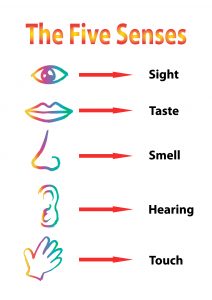Aim: To understand the impact and nature of sensory impairments that can arise following brain injury.
Following Acquired Brain Injury, damage to the sensory systems (vision,  hearing, taste, smell and touch) can arise from physical trauma to the sense organs (i.e. skin, tongue, eyes, ears, nose) but also directly from the neurological impairment arising from the injury.
hearing, taste, smell and touch) can arise from physical trauma to the sense organs (i.e. skin, tongue, eyes, ears, nose) but also directly from the neurological impairment arising from the injury.
Any assessment of sensory ability should also consider pre-existing sensory impairments and these should be managed appropriately (e.g. ensuring glasses, hearing aids are available and worn and any support needed to use these effectively is provided to the person). It is not unusual that pre-existing but unrecognised sensory deficits (e.g. needing reading glasses) may only be identified after the person has had a brain injury.
For a person who has had a brain injury, changes to their sensory abilities and their subsequent ability to respond to sensory information can have a significant impact upon their Activities of Daily Living (including looking after themselves and others, occupational and social activities), communication and their ability to perceive and understand the world around them. Quality of life may be significantly changed.
Taking a comprehensive history and a full assessment is necessary to identify and manage sensory impairment.
Sensory impairments requiring consideration following brain injury include: